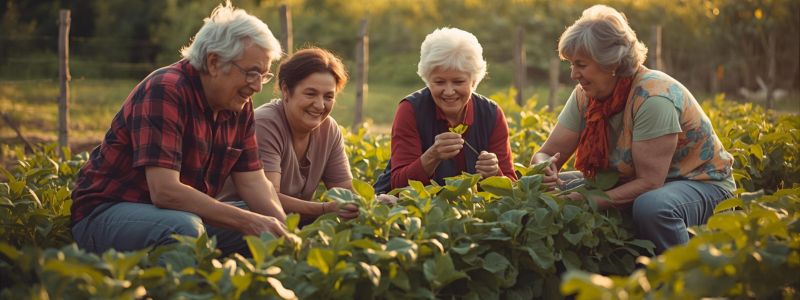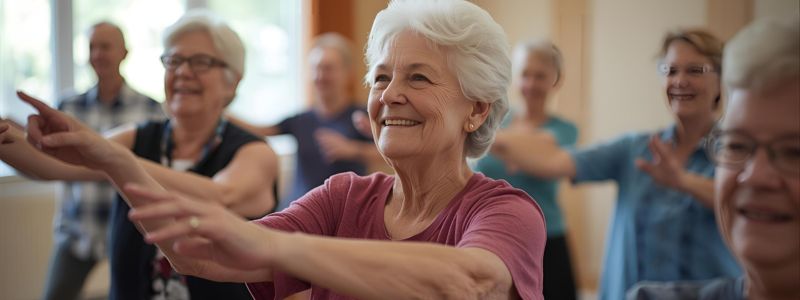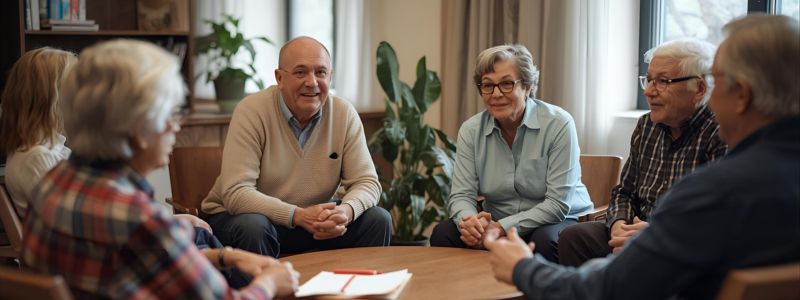
Active participation in group settings can transform how older adults retain information, solve problems, and stay emotionally resilient. By engaging in collaborative projects, discussions, and interactive sessions, seniors stimulate brain networks responsible for memory, attention, and reasoning. This guide maps out seven essential dimensions:
- The cognitive advantages of communal learning
- Social and emotional uplift through peer connections
- The most effective activity formats for senior learners
- Personalized strategies for choosing the right programs
- Key concerns families and seniors often raise
- The impact on overall brain health and sustained engagement
- Practical ways to locate local group learning opportunities
Throughout, you’ll find evidence-based insights, real-world examples, and practical checklists that support informed choices while gently introducing how Age Well Now’s holistic care solutions complement these enrichment pathways.
Cognitive Benefits of Group Activities for Seniors
Group activities for seniors enhance mental acuity by combining social interaction with structured challenges that stimulate neurons across multiple brain regions. Collaborative puzzles, memory games, and discussion circles deliver three core advantages: accelerated memory recall, refined problem-solving abilities, and boosted brain adaptability.
Improving Memory and Problem-Solving Skills Through Group Interaction
In group settings, seniors exercise recall by sharing personal stories, debating solutions, and sequencing tasks, which reinforces neural pathways associated with working memory and logical reasoning.
- They engage in shared mnemonic techniques that anchor new information to familiar contexts.
- Problem-solving tasks—such as team-based trivia—require synthesizing clues under time constraints, sharpening executive function.
- Peer feedback loops accelerate error correction and deepen understanding, creating lasting mental associations.
These interactive processes prime the brain for faster retrieval, laying the groundwork for more complex cognitive challenges ahead.
The Role of Neuroplasticity in Senior Learning Through Social Interaction
Neuroplasticity refers to the brain’s ability to reorganize synaptic connections in response to experience. In a social environment:
- Repeated group exercises stimulate new dendritic growth across the hippocampus, improving memory consolidation.
- Multisensory collaboration—combining sight, sound, and dialogue—activates parallel pathways, reinforcing resilience against age-related decline.
- Emotional arousal during friendly competition elevates neurotransmitters like dopamine, which promote learning and adaptability.
By fostering rich social contexts, group activities sustain the adaptive rewiring essential for lifelong learning.
Neuroplasticity and Social Interaction in Healthy Aging
Neuroplasticity, the brain’s ability to reorganize and form new neural connections, is significantly influenced by social interaction throughout life. Engaging in social activities stimulates neural pathways involved in communication and empathy, contributing to the brain’s adaptability and resilience against age-related cognitive changes, including a reduced risk of conditions like Alzheimer’s dementia.
Delaying Cognitive Decline and Dementia Through Group Learning
When seniors regularly tackle intellectually stimulating tasks within peer networks, they build a cognitive reserve that buffers against neurodegenerative processes. Structured group programs:
- Encourage consistent mental workouts that slow hippocampal atrophy.
- Provide reminders and cues in a social setting, reducing lapses and reinforcing routines.
- Integrate memory-support strategies, such as storytelling circles, which harness autobiographical memory to strengthen neural loops.
Maintaining these communal learning rituals can delay the onset of mild cognitive impairment and support overall brain health.
Social Engagement's Impact on Cognitive Function and Dementia Delay
Research indicates that frequent social activity is associated with slower cognitive decline and a reduced risk of developing dementia. Studies have shown that older adults who regularly engage in social activities can experience improved memory, problem-solving skills, and a significant delay in the onset of dementia, potentially by several years.
Social and Emotional Well-being Support for Older Adults

By bringing seniors together around shared goals, group activities foster belonging, reduce anxiety, and promote positive mood states. Communal learning environments create safe spaces for self-expression, empathy, and mutual encouragement.
Reducing Social Isolation and Loneliness
Participating in regular group sessions cultivates new friendships, expands support networks, and restores a sense of purpose.
- Seniors develop peer-based accountability that encourages attendance and consistency.
- Shared experiences—like co-creating art or solving puzzles—forge bonds that counteract isolation.
- Structured break periods in activities generate informal conversations that deepen connections.
Through these interactions, participants rebuild social fabrics crucial for emotional resilience.
Group Activities Combat Loneliness and Enhance Well-being in Older Adults
Group-based activities are effective interventions for reducing social isolation and loneliness among older adults, which are critical health epidemics. Participation in these activities fosters social connections, provides emotional support, and can lead to improved mental well-being, including reduced depression and anxiety, and a stronger sense of purpose.
Improving Mood and Emotional Health Through Community Engagement
Collaborative learning environments promote endorphin release, lower cortisol levels, and enhance self-esteem as seniors master new skills together. Research shows that:
- Group laughter and light-hearted challenges trigger mood-elevating neurochemicals.
- Reciprocal support in task completion increases feelings of competence and belonging.
- Celebrating milestones such as completing a collective project reinforces positive self-image.
Sustained community engagement becomes a reliable source of daily emotional uplift.
Beneficial Emotional Support Groups for Senior Learning
Peer-led circles and professionally facilitated support groups help seniors verbalize challenges, share coping strategies, and practice active listening. Key formats include:
- Storytelling workshops, where participants use narrative to process life events and improve communication skills.
- Mindfulness and discussion sessions that pair guided meditation with reflective sharing to manage stress.
- Peer mentorship cohorts, matching those with teaching experience to learners seeking skill guidance.
Such emotionally attuned formats reinforce both interpersonal trust and cognitive engagement, setting the stage for deeper learning.
Effective Group Learning Activities for Seniors
Seniors thrive in structured yet flexible environments that integrate intellectual stimulation with personal expression. Three high-impact activity categories stand out for promoting cognitive and social skills simultaneously.
| Activity Type | Primary Learning Outcome | Emotional Benefit |
|---|---|---|
| Creative Arts & Expressive Arts | Enhanced memory through visual cues | Confidence from creative achievement |
| Educational Workshops & Lectures | Improved knowledge retention and debate | Sense of accomplishment and community |
| Mind-Body Movement Classes | Better coordination and mental focus | Reduced anxiety from physical activity |
Enhancing Cognitive and Social Skills Through Creative Arts
Art-making, group music sessions, and drama workshops engage fine motor skills, pattern-recognition networks, and verbal expression simultaneously. Participants:
- Build attention and sequencing abilities when following artistic processes.
- Exchange feedback on their creations, practicing descriptive language and active listening.
- Celebrate completed works in group exhibitions, strengthening community identity.
This blend of creativity and collaboration yields multidimensional gains in memory, reasoning, and interpersonal confidence.
Educational Programs and Workshops for Lifelong Learning
Structured academic offerings such as book clubs, guest lectures, and language classes cater to curiosity and promote sustained intellectual challenge. Effective formats include:
- Intergenerational book discussions, where seniors lead or co-facilitate dialogues with younger readers.
- Thematic lecture series on art history, technology, or civic topics, followed by small-group debates.
- Language workshops pairing vocabulary drills with cultural immersion activities.
These academic programs reinforce critical thinking and stimulate ongoing discovery.
Integrating Cognitive Challenges in Physical and Mind-Body Activities
Movement-based classes like dance, yoga, or tai chi incorporate memory sequences, attention to posture, and rhythmic coordination:
- Dance routines require memorizing step patterns and synchronizing with peers.
- Yoga flows combine breath awareness with recall of poses, reinforcing mind-body connectivity.
- Group walking clubs integrate trivia stops, prompting on-the-spot problem-solving.
By merging physical exertion with learning elements, seniors support cardiovascular health while strengthening neural pathways tied to cognition.
Choosing the Right Group Activities for Senior Loved Ones

Selecting suitable group programs involves matching individual preferences, abilities, and care objectives. A structured assessment and integration process ensures that activities deliver both enjoyment and enrichment.
Assessing Senior Learning Preferences and Needs
Begin with a brief interview or survey that explores:
- Personal interests (art, reading, movement) and past hobbies
- Preferred learning pace (slow-paced discussions vs. rapid-fire quizzes)
- Physical and sensory considerations (mobility, hearing, vision)
Following this inventory, families can score preferences to prioritize program features and identify potential accommodations.
Integrating Group Activities into Holistic Senior Care Plans
Incorporate enrichment sessions as standing appointments within daily or weekly schedules, ensuring alignment with healthcare, nutrition, and rest needs.
- Coordinate with care professionals to avoid schedule conflicts.
- Use activity outcomes like improved mood or dexterity as metrics in overall care goals.
- Combine in-home and community-based options to balance familiarity with new social contexts.
This cohesive planning enhances consistency and maximizes the benefits of group learning within a comprehensive care framework.
Impact of Group Activities on Brain Health and Senior Cognitive Engagement
Regular engagement in group learning sessions cultivates a proactive brain-health regimen that unites social stimulation with mental exercise. This synergy fosters resilience against age-related changes and sustains long-term engagement.
Scientific Evidence Supporting Group Learning for Brain Health
Clinical studies link social engagement and mental stimulation to a 30–50% reduction in dementia risk. Group puzzles and classes trigger:
- Elevated neurotrophic factors (e.g., BDNF) that support neuron survival
- Increased cerebral blood flow during collaborative tasks
- Enhanced synaptic density, evident in imaging studies of active learners
These findings confirm that communal learning accelerates protective brain mechanisms.
Synergy of Social Interaction and Cognitive Stimulation in Learning
Social interaction provides emotional reinforcement that motivates continued participation, while cognitive challenges drive neural adaptation:
- Peer feedback validates performance and fosters a growth mindset.
- Shared problem-solving encourages perspective-taking, which enriches cognitive flexibility.
- Positive group dynamics increase release of mood-boosting neurotransmitters, improving attention and memory consolidation.
This interlocking process deepens retention and sustains enthusiasm for future learning.
Long-Term Effects of Group Learning on Senior Mental Well-being
Seniors who commit to ongoing group programs demonstrate:
- Greater emotional stability and reduced depressive symptoms
- Slower progression of mild cognitive impairment
- Higher life satisfaction tied to social purpose and achievement
These sustained benefits underscore the value of making group engagement a routine component of healthy aging.
Finding Local Group Learning and Community Programs
Accessing nearby opportunities requires a combination of online search strategies and community outreach to ensure inclusivity, accessibility, and alignment with personal interests.
Discovering Senior Learning Activities Locally
Start with these approaches:
- Use local government or library event calendars to identify free classes.
- Search community center listings by “senior learning programs” and filter by location.
- Ask healthcare providers or senior care advisors for recommendations.
- Join social media groups focused on older adult enrichment in your region.
Combining digital searches with word-of-mouth yields the broadest program visibility.
Group Learning Programs in Senior Living Communities
Many assisted living and retirement communities prioritize enrichment through:
- On-site art studios, classrooms, and performance spaces
- Partnerships with continuing education institutes for guest lectures
- Collaborations with fitness studios for adaptive exercise classes
Evaluating community amenities and programming calendars helps families compare options effectively.
Final Thoughts
A purposeful blend of mental challenges and social connections empowers seniors to maintain sharper minds and richer emotional lives. Embracing group learning not only strengthens memory and problem-solving skills but also paves the way for enduring well-being. By assessing individual needs, exploring local programs, and partnering with expert providers like Age Well Now, families can ensure that older loved ones thrive in environments designed to uplift mind, body, and spirit.

